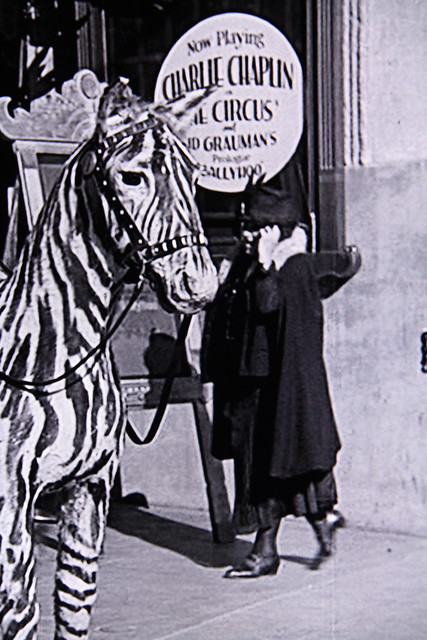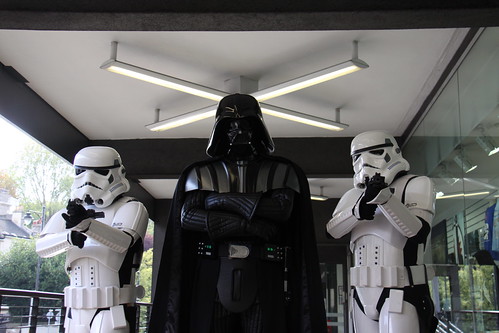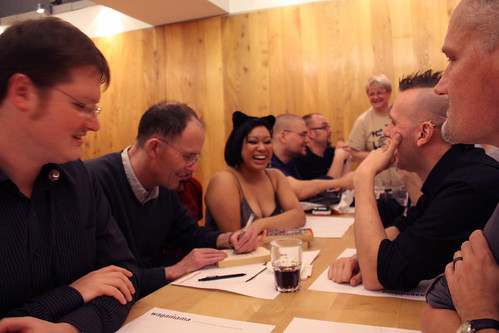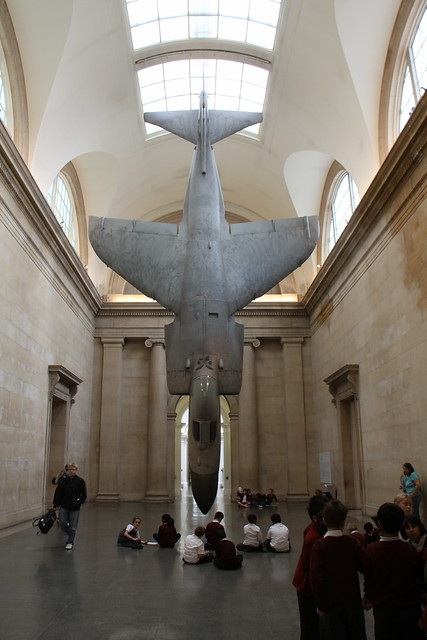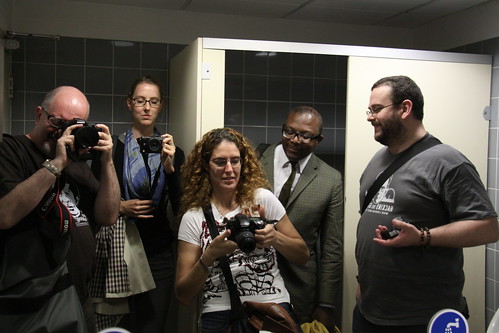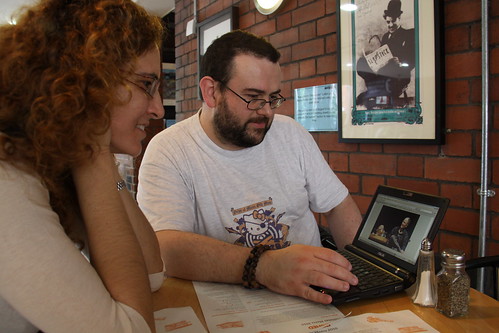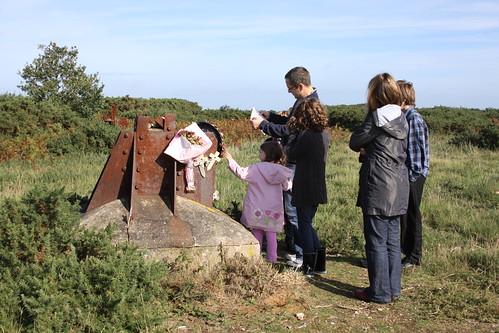So, Halloween has come round again and October is nearly at an end. It doesn't seem like a month ago that we were getting ready for Mum's funeral and even now I still catch myself thinking I ought to ring her up for a chat; Sundays are particularly hard because that's the day we'd always use to catch up with what was going on. Things have felt a bit bleak once or twice this month. I spoke to Dad earlier and he seems to be doing OK, but it must be even harder for him. Still, Dad has a network of very supportive neighbours who have been wonderful.
As for me, I've been trying to keep the depression at bay by being busy, and going out and doing stuff. For the most part it's worked - it was great to hang out with the WGB folk in particular, but as you can see from the entries below I managed to avoid too much moping around at home. I've also been to several gigs this month: last weekend I saw Joe Satriani at the Birmingham Symphony Hall, on Thursday night I saw Hellyeah, Avenged Sevenfold and Stone Sour at the Birmingham National Indoor Arena, and on Friday night I saw Francis Dunnery (with David Sancious and Tony Beard in the band, no less) at the Colston Hall down in Bristol. They were all splendid gigs.
But for the last couple of days I've just felt like staying at home and watching TV, so that's what I've been doing. In particular, I've been watching an anime series called Darker Than Black which fellow Wigbers Olga and Peter suggested I would like. They were right - I do! I was amused to discover that one character who crops up in the first couple of episodes is voiced in the English dub by Colleen Clinkenbeard, whose performance as the profoundly eccentric NPC Patricia Tannis in Borderlands is one of the most amusing aspects of the entire game. Darker Than Black's storyline is interesting: something bizarre has happened to a couple of places on Earth. In South America, we learn that a large chunk of the planet has disappeared entirely. In Tokyo, a cratered ruin is isolated behind immense walls. The Moon has disappeared and the stars have been replaced by mysterious fakes; fakes which appear to be linked to the actions of superhuman individuals on Earth called "contractors." Over the course of the series we discover the consequences of these events and how Tokyo's "Gate" affects the lives of the main characters who live and work in the city on both sides of the law. I'm about half way through the series at the moment and enjoying it immensely.
Here's a straightforward sounding question that turns out to be anything but simple: is this person talking on a mobile phone? At a first glance it certainly looks like they are...
The question is not so straightforward because the photo above is a still from some footage shot outside Grauman's Chinese Theatre in Los Angeles for the premiere of Charlie Chaplin's 1928 film The Circus. Thanks to Jason Kottke for the heads up about "Chaplin's time traveller" and thanks too to George Clarke who posted the original footage from the DVD on YouTube. The footage appears as an extra on the DVD release, and George Clarke quite rightly thinks it's a bit weird that the woman in the hat appears to be talking on a mobile phone.
The thing is, I've got the same box set that George has, so I dug out my copy to have a closer look. Sure enough, the footage is right there on the extras disc for The Circus in the "Documents" submenu. George can stop worrying that the footage is some Dr Who Blink-style message intended solely for him - it's on my copy too. All the same, there's definitely something weird going on, and I agree with George - the person definitely appears to be talking to someone.
However, their hand looks a little further forwards than I'd expect it to be for someone using a mobile phone. Instead, was the person perhaps trying to hide the fact that they were giving direction to the film crew and holding their hand up to mask the fact that they were talking to the camera? In his YouTube video Clarke notes that the figure looks - well, a bit butch. Those features are difficult to make out, but they do look kind of familiar.
Is the mystery woman, in fact, Chaplin himself having a laugh?
When you visit the city, you'll now be able to make use of free Wi-Fi around many of the council's buildings - 37 so far. The council is also making reconditioned computers available to low-income families for as little as £35. I guess this is the flipside of the story I blogged about yesterday: making access to new media available for all. Well, as long as you're within a stone's throw of the nearest library, anyway. For rural families on a low income, it's not going to make much difference until someone comes up with a new technology that changes the game.
The Royal National Lifeboat Institution is warning residents in Redcar to stay away from the beach tomorrow as they're expecting heavy seas, with waves up to 15 feet high to be breaking on the shore. This winter is getting off to a distinctly bad-tempered start, isn't it?
Analysis of wear marks on 30,000 year old grinding stones found in Italy, Russia and the Czech Republic suggest that back then our ancestors already knew how to make flour. When they ate meat, would it have been served in a bun, wonders the New Scientist magazine.
HAPPY INTERNATIONAL CAPS LOCK DAY, EVERYBODY!
BBC blogger Rory Cellan-Jones has been hanging out with some students who - shockingly - were subjected to the torture of being deprived of their media connections for a whole day. No TV, no radio, no mobile telephones, no Internet; my goodness, how did the poor things survive? By going to lectures instead, perhaps?
For some of us, dropping off the media map is no big deal. There are a lot of people in the UK who don't consider having broadband, smartphones or Twitter accounts to be important and they probably outnumber the ones who do by a significant margin. Whenever I stay in Norfolk, I assume I'm not going to have any media access whatsoever and while it's nicer to stay in touch with my friends, I wouldn't for one moment consider that the loss means I experience anything remotely resembling suffering. If anything, I'm sure the experience does me good. When I stay at Dad's place, I go out and get more exercise, I sleep better, and I don't get subjected to the garbage produced by most of the big media organisations. I'm struggling to see the downside of that.
Reading the comments on Cellan-Jones's blog entry is quite informative, too - the majority of reactions are along the lines of "so what?" Stories like this don't do the BBC any favours. They can be used (with some justification) to bolster the idea that media types are out of touch with reality, or that they have a vastly overinflated sense of the value of their work. Indeed, new media types can be so narcissistic that even overt ridicule ends up being painfully close to the truth. And that's scary.
Suddenly, winter's arrived. The display in the car said "ICY" as I headed for the motorway this morning and a couple of hours later people were tweeting from Aberdeen saying it was snowing. As I sit here this evening typing up the blog, it's 7°C outside but it feels much colder and I've just put the heating on for a bit. I haven't done that in a while. The days are growing noticeably shorter, too - at just after quarter past six I've already got the lights on in the living room and when I get up to go to work in the morning it will still be dark. It won't be long before the clocks go back, either. Even so, I was quite taken aback today when I spotted this year's first "harsh winter ahead" story, in the Guardian.
Perhaps as a result of the lengthening hours of darkness I'm feeling tired and hungry most of the time. So I wondered: do humans get the urge to hibernate? According to the British Medical Journal, the answer seems to be (in extreme cases) that they do. However, actual cases of human hibernation - the sort involving disappearing under the duvet in November and not reemerging until March - appear to be based on wishful thinking rather than measured biological processes. Which is a great shame, really.
You can always tell when the new academic year really starts to kick in: my internet connection at home gives up the ghost from about six in the evening until just before midnight. My router's just fallen off the net as I type this, so I guess any updates are going to have to wait. Last week when it happened, I tried calling BT's support line but gave up after quarter of an hour: the experience was becoming painfully close to this. Talking with somebody on the other side of the planet who knows less about the Internet than my father and who is hidebound to work through a script designed to identify faults I've already discounted is not my idea of an effective customer service experience.
Luckily these days I can also get the Internet on my phone, and a couple of minutes with Safari revealed that the BT Gigabit link into IDNet has fallen over again. That's the second time in just over a week and the folks at IDNet are understandably less than impressed. Neither am I.
(Archive Update: See the note for my blog entry of 7th March 2012 for the interesting way in which my Internet connection problems were eventually resolved.)
At the weekend I was lucky enough to catch a screening of the restored version of Fritz Lang's classic science fiction film Metropolis. You may remember that a couple of years ago I blogged about the discovery of a 16mm print of the film which contained more than 20 minutes of footage that had previously been thought lost. That recovered footage has now been worked into an existing print of the film, filling out the running time to 153 minutes. It's been on a limited release for a couple of months and last week it arrived at the Electric Picture House in Wotton.
Watching the results, it is of course immediately obvious where the insertions have been made - the extra footage has deteriorated badly after spending the best part of 80 years locked in a vault. The images are striped and grainy and they don't quite fill the frame, but their effect on the film is dramatic. The narrative of the film has been expanded; the extra content makes the story much more complex, but at the same time more coherent. The only parallel I can think of is my reaction to the extended versions of the Lord of the Rings movies that were released on DVD after the movies came out; for me the resulting films felt shorter rather than longer, because I was much more involved with what was taking place and the narrative thread presented was so much stronger.
The audience I saw the film with laughed on a number of occasions; some aspects of the movie have not aged well and for 21st century sensibilities, the running about and fighting in particular appear faintly ludicrous, evoking the overcranked histrionics of the Keystone Cops. It's safe to say that comedy would not have been the director's original intention. But the innovations Lang brought to bear in the movie still have the ability to astonish: montage, hand-held camera work, tracking and POV shots are all used, and when you realise that the film was made in 1927, the close up of Freder's hand reaching out to pick up Maria's discarded shawl is stunning. And yes, the assemblage of disembodied, blinking eyes (the fourth image on this page) still gives me the heeby-jeebies.
Sadly, gaps in the film still remain. By all accounts, the original release was nearly an hour longer than this one and the footage still missing probably is lost forever. But the sheer scale of what has been restored is exhilarating. In particular, the sinister-looking Thin Man now appears in an entire sub-plot rather than as an unremarked and unexplained character standing in Joh Fredersen's office. We see far more of Gyorgy - the worker who Fredersen's son replaces at the beginning of his journey throught the city's underworld. Brigitte Helm's performance as both Maria and her robot doppelganger becomes even more extraordinary as the two characters are compared and contrasted in more detail. Maria is serene and calm; her robot is twitchy, bird-like, manic. Mad inventor Rotwang becomes a more sympathetic character as we learn what drives him.
If you've never seen Metropolis at all, you're missing out on one of the true landmarks of cinematic history. Lots of imagery from the movie has found its way into popular culture, and it's had a huge influence on the films that followed it. Now that the restoration is available, and you have a chance to see it, you have even less of an excuse for missing out: go and see this extraordinary film as soon as you can.
George Monbiot's column in the Guardian today is just about the most depressing thing I've read in a long, long time. Because, sadly, I think he's absolutely right. We get the government we deserve, the saying used to go. Now we're not even that lucky...
Last Saturday at the William Gibson signing I ended up talking to Danie Ware, Forbidden Planet's PR and marketing whiz about the events FP organise. I've been coming to them for nearly thirty years and they've always been extremely memorable. "You have to come to the Bristol branch next weekend," she told me. "It's 'Star Wars Day.' It'll be madness." So yesterday morning I headed up to the Triangle in Bristol to see for myself.
She was right. It was:
I got some great shots, too. Huge thanks to the guys from the 501st Legion for putting on a most impressive show.
On Tuesday night I was in Bristol to see Glenn Hughes, who used to sing and play bass in the "Burn" era lineup of Deep Purple. The last thing of his I bought was the Fused album he did with Black Sabbath's Tony Iommi, which is a heavy rock masterpiece. On Tuesday we got an evening of classic 70's style rock sung entirely without irony by a stalwart of the genre, one who clearly still has a quite extraordinary voice. He's fairly nifty on the bass, too.
Hughes was joined by Danish guitarist Søren Andersen, Bristol-based keyboard player Anders Olinder and a wildly enthusiastic drummer with the unlikely name of Pontus Engborg. It was great fun - but it did feel a bit like travelling back in time thirty years or so...
Well, recent photos from the Hubble space telescope have got the Internet buzzing. They show an x-shaped debris field spreading away from an asteroid collision. It's rather wonderful the way we get to see things like this nowadays, and very entertaining how people use it to support any number of bonkers conspiracy theories. This one will keep them going for years.
You might remember me having a rant back in May about the misinterpretation of Albert Mehrabian's book silent messages by people ostensibly teaching you how to communicate properly. Well, here's another rant on the same subject. I was reading through the discussions on Edward Tufte's website today and came across this thread about the mythical number seven as a suggested limit to the amount if information you can present simultaneously to a student. The figure is endlessly regurgitated in courses about training design with little or no qualification of context: never use more than seven bullet points, seven variable names, seven words, seven sounds, it makes no difference. The figure may be qualified with the addition, "plus or minus two" which gives the impression that it's taking into account the natural variation in people's cognitive processing capabilities and conveys a more "scientific" feeling to the recommendation.
This figure is usually cited with regard to a paper given by George Miller back in the 1950s when he was investigating information processing ability in humans. So far, so good - but he was interested in the very basic abilities of the brain and as a result the tests he used were intentionally very limited and one-dimensional. If you read the paper, you'll see that he asked users to distinguish between what were in effect a set of musical notes. Reading the original paper is enlightening. Note in particular the "ignore the time variable completely" statement on page 3. The subject of Miller's exercise is given as much time as he or she wants to make a response, but you'd expect time to have a fairly significant effect as far as the quality of the decision making taking place is concerned. So: all the original experiment measured was an individual's ability to distinguish between a number of audio tones that were played. The connection with learning is quite weak. It's much more about information processing and working memory. And what did Miller actually find out? When a subject only had to distinguish between two or three tones, they almost never made a mistake. When they were played four tones of different pitch, it was slightly more likely that they would make a mistake. By the time 14 different tones were being played, most subjects struggled with the task. Miller found that on average, people could distinguish between tones of 6 different pitches. Any more than that, and they began to get confused.
But now things get interesting. Later on in the same paper, he cites a study by Pollack and Ficks in which sounds were given more than one dimension. When users were asked to distinguish, not just between pitch, but also between tones of differing intensity, between the rates at which each tone was interrupted, between the fraction of time the tone was on as opposed to off, its total duration, and where the tone was coming from oriented with respect to the listener, they found that the avarage ability of the test subjects allowed them to distinguish between around 150 different tone examples. Not seven, plus or minus two, but around one hundred and fifty. That's unlikely to be an upper bound, either.
Miller takes great pains in the paper to point out that the magical "seven items of information" as the optimum amount of data people should be presented with is a very limiting bottleneck. And he indicates how, by splitting the items of information into a number of different dimensions (tone, volume, duration) and by recoding information into larger chunks, it's actually possible to present much, much more than those seven items at once without overloading the learner. People are quite obviously capable of processing much more than seven things at once, as even a few minutes' contemplation would clearly show. How else would we cope with driving on the motorway, or playing football, or playing music in a band, or doing any one of a thousand things that we manage every day without any conscious effort?
It's still important to organise information into manageable and easily-digested amounts, of course. I have no argument with that at all and as a trainer, I often hear the word "chunking" used to describe the aggregation of larger amounts of information into smaller groups. Chunking is good. But when training material and "how-to" guides stick dogmatically to the "seven, plus or minus two" rule regardless of its original intent all it tells me is that people haven't done the research. They've looked up the reference but not read the paper. The discussion on Tufte's site I linked to just now includes an email from Miller himself describing his dismay over just one misrepresentation of his work.
Interesting, isn't it?
I've spent most of this afternoon uploading photos to Flickr. Want to see how we Hack the Gibson?
The date today is, of course, 10-10-10.
101010 in binary is of course 42 in decimal. Have a great hitchhiker's day!
It's actually the early hours of Sunday morning, but I'm too tired to be picky; I've just spent another great day hanging out with the folks from the William Gibson Board in support of author William Gibson's book tour. Back in 2007 I had to leave the festivities early as I was working on a video shoot at a nuclear power station. This time I was able to stick around, so last night I and the other WGB folks found ourselves in the extraordinary situation of sitting in Wagamama's in Soho having dinner with the man himself:
As you can see, he was graciously still signing stuff at the end of the evening!
The last week has been quite extraordinary. I drove down to Dave and Cathy's on Sunday night and caught the train into London on Moday morning (and that's not something I've done for a while). I spent the day wandering around London taking photos of stuff and visiting exhibitions like Fiona Banner's installation at Tate Britain:
Then it was time to head over to the Cadogan Hall to see Bill in conversation with Cory Doctorow, the first public event on the UK leg of the Zero History tour. I don't think the organisers were prepared for the type of audience they were going to get - they'd run out of books to sign pretty rapidly! I really got the impression that Bill was enjoying himself far more this time round, and not just because he's been in the country for a week so he's not at all jetlagged. In the Q&A sessions over the next couple of days, the subject of his writing's warmth, sense of humour, and general emotional maturity cropped up many times and when he read aloud from the book, he didn't just read it, he performed it. It was huge fun to watch him enjoying himself so much. For Monday night's reading I was joined by an advance guard from the William Gibson board: Lilly, Olga, Other Kosh, Woodrow and Bridget. Olga had travelled over from Greece for the week's events, as she did last time - I hadn't seen her since 2007 and it was great to catch up. Afterwards a whole bunch of us headed over to a nearby restaurant and sat there eating and chatting until gone 11pm. I could have listened for the rest of the night, too - I really didn't want to leave!
As the week progressed more and more of the WGB crew arrived. On Tuesday morning I met up with Olga and Candace and we spent an enjoyable few hours doing touristy things around London including the British Library, the British Museum and shops around Oxford Street and Soho. I also called in at Forbidden Planet to make sure I had a copy ready for signing... In the afternoon we were joined by Peter, who had travelled down from Glasgow on the train. By this time we needed to stock up on caffeine (at the amazing Flat White in Berwick Street in Soho) and sugar (in the form of a red velvet cupcake from the Hummingbird Bakery in Wardour Street). Suitably replenshed and refreshed, we headed on over to Foyles for Bill's second appearance. We were eventually joined by Woodrow, who had got stuck in the life with Bill on his way up to the Gallery! Again the talk was relaxed and entertaining, and the questions were interesting ones. Someone asked Bill which books he'd enjoyed reading over the last year, and he mentioned two: Zoo City by Lauren Beukes (someone that he retweets quite regularly on Twitter) and The Magicians by Lev Grossman. I remember thinking that would be another couple of books to go on my reading list! Again, Bill mentioned one of the characters in Zero History - Winnie Tung Whitaker - and remarked how little of an impression she seemed to have made on people, despite being, as he put it, "the only character in any of my books who has ever drawn a salary." He seemed genuinely disappointed by this, despite the fact that she effectively saves everybody's bacon at the end of the book. I suspect we haven't heard the last of Winnie... I got my copy of the book signed at last and we even managed to grab a Restroom Project photo on the way out:
I picked up the car from Dave and Cathy's place and headed back to Bristol for the next day's shenanigans. For a change the day dawned bright and sunny - a welcome change from to very dull and grey days in London. I met Olga and Peter off the train at Temple Meads and we walked into town. Over a spot of lunch in the Watershed Cafe, we checked up on the last few days on the William Gibson Board:
We climbed Park Street up to Forbidden Planet and I found a hardback copy of Zoo City on the shelf - a signed copy, at that. I took this as a sign and bought it immediately. As we sat in Caffè Nero topping up our caffeine levels and checking Twitter, we discovered Bill was stuck on the train and running an hour late. Today has really brought home how the ways in which we communicate have changed in the last decade or so. It's also thrown last week into stark contrast, as all of these new communication channels effectively disappear when I get to Norfolk. And the ubiquity of the Internet followed through on tonight's talk, which the Watershed have made available in its entirety, for free, on their website. That's me asking the first question in a very croaky voice; my cold wasn't getting any better.
After two days working at home (I really wasn't up to going in to the office and spreading my germs still further) it was back to London for Saturday's events and another extraordinary say. After last week's funeral this was just what I needed to get me back on an even keel and I can't convey just how therapeutic it's been. I'm very grateful to Bill and all the wonderful people from the WGB for making the last week such a memorable one.
It's just after three in the afternoon and I'm sitting in the living room in my parents' house in High Kelling in Norfolk. My brother Andy and his family left for Windsor an hour or so ago; they're staying there overnight before flying back to California in the morning. Now there's just me and my father here and as Dad is taking the dog for a walk at the moment, the house feels very empty. To give myself something to do, I've decided it's about time I got back to updating the blog and here we are. It's been a very emotional few days, and I'd like to say thank you to all the people who have sent messages of condolences and support.
Mum was an exceptional person, and the way people have responded to the news of her death has only served to emphasise that. The church had the largest attendance they've ever had for a funeral, so many in fact that a marquee had to be set up in the church grounds, and the marquee was full as well. Most of the village seemed to be there, together with a number of Mum''s friends that she has known for years. It felt like we'd given her a good sendoff, but it's still difficult to accept the fact that she won't be around any more.
The funeral was held on Friday; it was a stormy, blustery day even if the rain held off until the evening. In contrast, yesterday was a lovely day with light breezes and lots of sunshine. Dave and Cathy got most of the kids together to head out to the beach at Salthouse, and we also called in at Bard Hill just above the village to see the remains of a radar mast. On the 15th January 1945 an RAF Lancaster from Skellington in Lincolnshire struck the antenna and crashed on Kelling Heath with the loss of everyone on board. I'd never heard of the event - my brother had discovered the story as he searched on the Internet for details of another crash involving RAF aircraft that happened over Kelling. The foundations of the antenna are still there, and one corner acts as an informal memorial to the event.
We spent half an hour or so on the beach at Salthouse. In comparison with a couple of weeks ago, the sea was like a mill pond and it was possible to make out an enormous crane over the horizon which is being used to position the bases of the many wind turbines that are being installed off the coast. The view from the beach will look very different in the not-too-distant future.
Today the weather is back to normal for this time of year and I can hear the rain falling on the conservatory roof. This evening I head down to Dave and Cathy's place in London. I'll be staying there for a couple of days as the WGB convene for various events surrounding the launch of Zero History. It'll be good to see everyone again, and the launch of a new book by William Gibson is something to celebrate.

